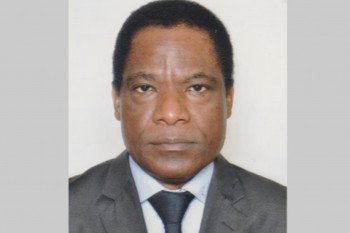Events

October 2020
H.E. Mr. Joseph Giraud Effangone-Obaghe, Ambassador of the Gabonese Republic
UPDATE: Nov 12, 2020
Expecting Japanese Cooperation for Economic Diversification
—- The Gabonese Republic faces the Atlantic Ocean on the West Coast of Africa. Would you talk about the current features of your country?
Gabon is bounded by the Atlantic Ocean in the west, owning the Exclusive Economic Zone (EEZ) about 200 000 km² on which the country exercises the sovereign rights. Rich in fish resources, Gabon owns 800 km of coasts. Besides the oil, Gabon has also many mineral resources and focuses on exploitation of manganese. Others natural resources are not yet exploited, except the gold. Gabon holds as well important iron reserves. The Gabonese forest is the second potential in Africa, with current stock of 400 million cubic meters of exploitable wood. The fauna and flora are well preserved and protected in Gabon in the natural reserves and 13 national parks.
—– What is the content of the national strategy << Gabon Emergent 2025>>?
Under the leadership of H.E. Ali BONGO ONDIMBA, President of the Republic, Head of State, Emerging Gabon 2025 vision is based on 3 strategic goals and indicates how to achieve them through 28 programs and 159 economic actions. The first axis is about consolidation of 4 so-called foundations of the Emergence that are sustainable development, governance, human capital and infrastructures. The second is based on diversification of the pillars of growth for a successful transformation. In 2025, Gabonese economy will be built on 4 pillars: Industrial Gabon (underground richness), Green Gabon (valorization of country soil resources and especially its forest heritage and its exceptional biodiversity), Gabon of Services (optimization of the human capital) and Blue Gabon (valorization of its fishery resources). The third is shared prosperity designed to ensure economic growth generated by the implementation of foundations and erection of 4 pillars of Emergence.
—– What measures is Gabon implementing to diversify the economy?
The national strategy of economic diversification intends to be more selective and refocused on support to reforms and infrastructural development which would foster a more attractive business environment. The objective is to promote the private sector as motor of the diversified growth. To achieve this, the Government decided to redesign and boost all supporting and accompanying instruments for companies in Gabon with a new Chamber of Commerce, a new National Agency for Investment Promotion, reformed business law, creating Special Economic Zones (SEZ) and institution of a high council for investment promotion.
—– Japan and the Gabonese Republic keep long-standing friendship. As Ambassador to Japan, what is your priority mission for further strengthening the bilateral ties?
In accordance with prescriptions of my Government, the economic diplomacy is one of my priority missions. The current context where economic diversification is under way in Gabon, I am dedicated primarily to raise the interest of Japanese private stakeholders so that they could participate in Gabon’s economic structural transformation, because they are welcome there to do what they are deploying admirably in the world. Japanese companies have undeniable assets to take the place which is theirs in major investment projects scheduled by Gabonese authorities. For me it’s developing and deploying a campaign that promotes elaborated projects through investment opportunities linked to the national economic development plan in the sectors regarded as high-priority and carrier of added values.
—– How is Gabon dealing with Covid-19?
The risk on spreading Covid-19, the Government presented immediately on 3rd April 2020, a National Plan to Respond to the COVID-19 focused on 4 points: The first point, governance of the Plan. A steering committee (COPIL) was set up including all ministerial departments committed by competence and assisted by a Scientific Committee. The second, dedicated to sanitary aspect.It consists of massive screening of populations by setting up an efficient laboratory, isolation in the event of a positive test to hinder the spread of the virus, treatment on the basis of a protocol validated by the Scientific Committee to guarantee a better cure rate and awareness of barrier measures. The third, considering social aspect of this pandemic, to protect citizens from adverse effects. The last point, concerns economic aspect and organizes management of perspectives on the country’s macro-economic balance.
(Interview by Shu Tamaru, FEC Counsellor)